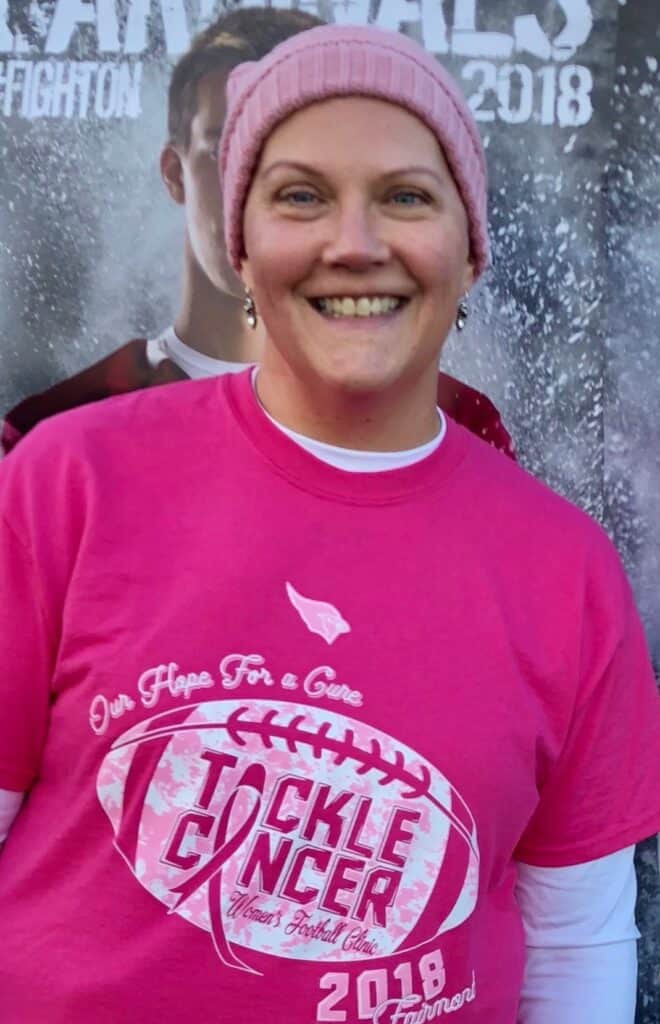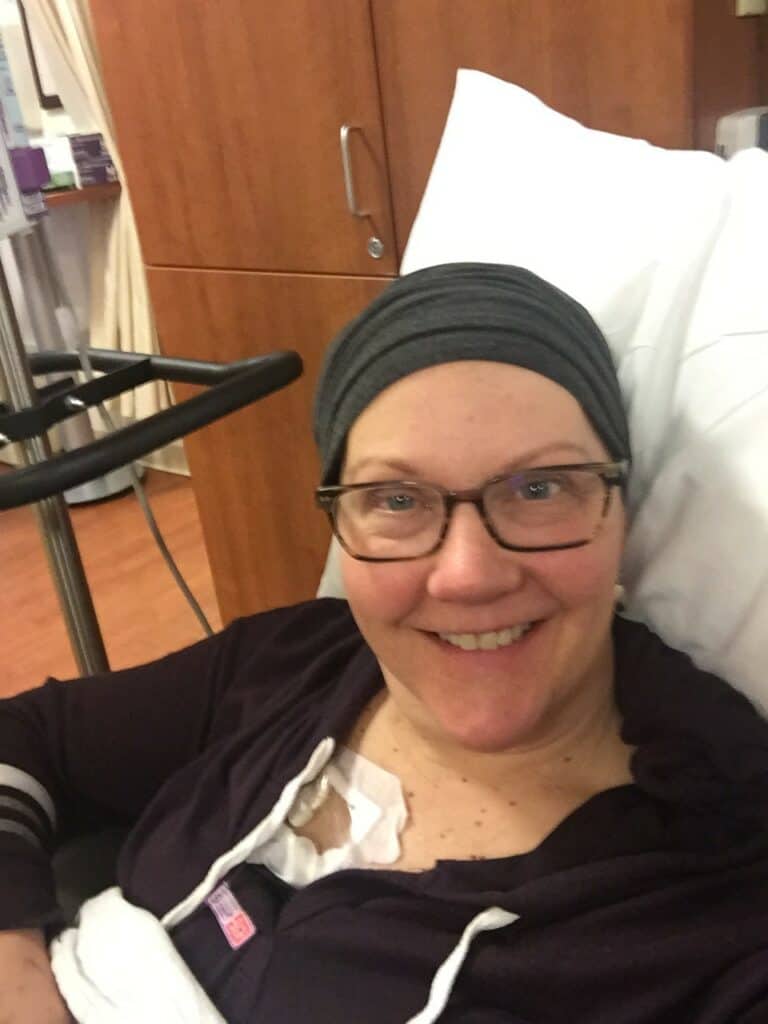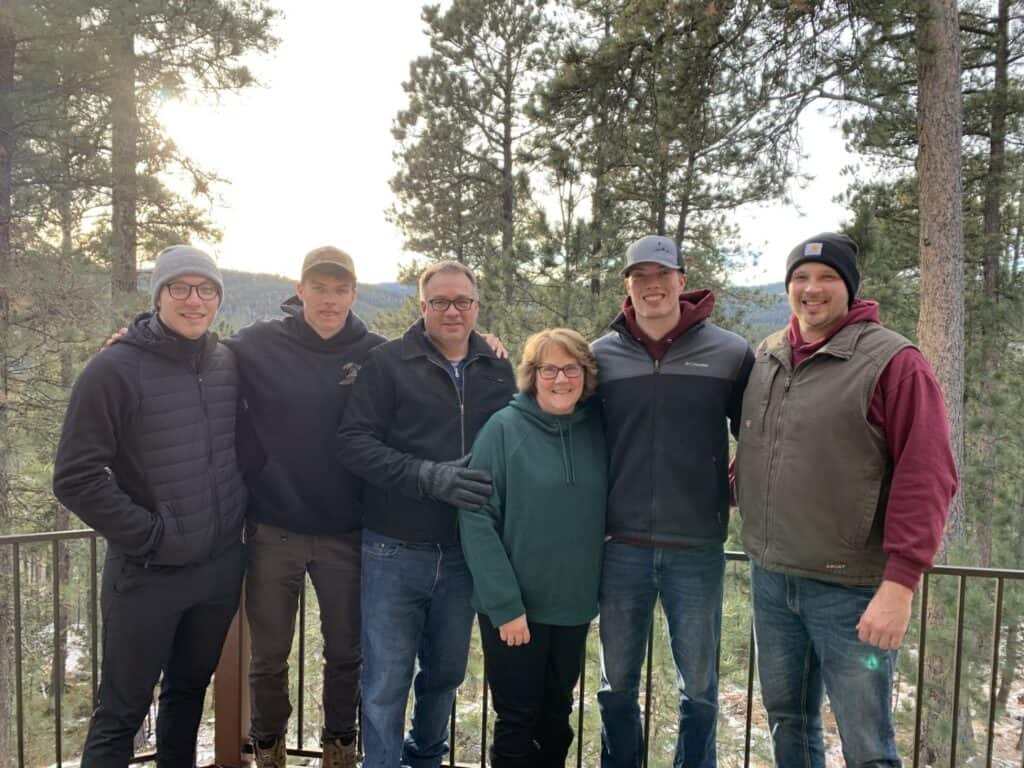In a small, rural town in southern Minnesota, Cyndi spent her days as a wife, mother and high school English teacher. In 2018, after she tried everything to mitigate persistent rib pain, she had an appointment that set her on a path she never anticipated.
“I thought maybe I had slept wrong,” Cyndi recalled. The discomfort lingered, prompting her to visit her primary care doctor. She tried various remedies, from chiropractic care to a new mattress, but nothing alleviated the pain. “Things just didn’t feel right,” she explained. After a series of tests including a mammogram, ultrasound, and finally, a biopsy, the diagnosis was breast cancer.

Cyndi’s initial reaction was one of confusion. “I had never heard of people referring to breast cancer as painful before,” she said. “I asked my doctor to do a few more tests, which revealed the cancer had metastasized (spread) to my ribs.” At the age of 49, Cyndi’s official diagnosis was stage 4 metastatic breast cancer (MBC).
With this new reality came treatment decisions that had to be made fast. The doctor who gave her the diagnosis talked about a treatment plan that started out slowly and would ramp up “if needed.” Cyndi didn’t agree. “I wanted to attack things head-on,” she recounted. “I was feeling so discouraged about the course of action my doctor wanted to take for my treatment. Three days in a row while I was cooking dinner, the little television in my kitchen played commercials for the City of Hope Center. I took it as my sign to seek them out and get a second opinion.”
Cyndi traveled to Chicago, where the oncologist proposed an aggressive treatment plan. This approach resonated with her. “It aligned completely with what I was thinking,” she said.
Starting in August 2018 until the onset of the COVID-19 pandemic in 2020, Cyndi traveled to Chicago every three weeks for treatments and scans. The center offered a comprehensive approach to cancer care. “They treat the whole body, mind and spirit,” Cyndi shared. Her appointments included therapy sessions with a licensed counselor, physical therapy, acupuncture and meetings with a nutritionist. “Everything I didn’t even know I needed at the time was all there,” she noted. This holistic treatment was crucial for her during treatment.

Despite being very satisfied with the care she received in Chicago, the logistics of travel during the pandemic became too challenging. “COVID hit and it just got complicated with travel and staying somewhere every time. Since my situation had stabilized, we decided it was best for me to continue treatment back home,” Cyndi said.
Throughout this journey, Cyndi’s support system played a crucial role. She and her husband, Brad, knew each other throughout high school, reconnected during college and have been together ever since. They worked as teachers in the same school district. Brad, who is also a football and track coach, along with their four sons, have been her pillars of strength. “My family became my rock,” Cyndi said. Two of her sons were in high school when she started treatment and her sister-in-law and best friend rallied around her, making sure she never missed one of the boys’ football games.

As Cyndi moved forward with her journey, she sought ways to keep her extended network of family and friends updated. “I relied on a website called CaringBridge,” Cyndi shared. CaringBridge is a no-cost, personal health platform that surrounds patients, caregivers and families with emotional and social support. It’s a way to connect with loved ones, share health updates in one place at one time, and seek help with things like transportation, meals and other tasks at home. CaringBridge became a crucial platform for Cyndi to share updates on her treatment and health status with her close circle without the broad exposure of social media. It allowed her to communicate with people from her past — those who knew her and her family well but weren’t necessarily connected to them through more traditional social media platforms.
Cyndi appreciated how CaringBridge allowed her to provide meaningful updates while receiving supportive messages in return. “The feedback that I’ve gotten from folks on there now is just…they understand that no news is good news, but they want to know how things are progressing,” she explained. “I’ve always worded things in a positive light, especially when I was going through the really challenging parts of my treatment.” Balancing honesty about her struggles with a positive outlook was important to Cyndi. “CaringBridge became a vital tool for me during my initial experience and even now.”
Cyndi continues her treatments back in Minnesota, grateful for the stability she has in terms of her treatment plan. She is a member of Komen’s MBC steering committee and a vocal advocate for ShareForCures. At first, Cyndi was hesitant to share her breast health data with ShareForCures, “I didn’t really expect to live this long and so I didn’t feel comfortable in sharing my experience if I thought it was not going to end well,” she shared. Cyndi’s perspective shifted as she found stability in her treatment. With this, she embraced the opportunity to impact research by sharing her data. “When I hit my five-year mark, I thought, ‘now I want my story to be a part of the research that needs to focus on long-term treatment and, of course, a cure would be phenomenal.’ I don’t even know how close we are to that, but my realistic side wants to know research is leading to treatments that will help me live the longest I possibly can.”
Cyndi’s story highlights the importance of self-advocacy and seeking answers if something doesn’t feel right, all while illustrating the importance of considering second opinions. “I truly credit my second opinion as saving my life,” Cyndi remarked. By believing she deserved a treatment plan that aligned with her vision, she was able to find a treatment center that not only changed the treatment options she was given, but treated her in a holistic way that helped her gain peace and perspective. Now as an advocate in so many ways for the MBC community, Cyndi intends to continue sharing her story and speaking out so those with similar experiences can know they have company where they are.
At the time of this writing, City of Hope is not affiliated with or endorsed by Susan G. Komen. CaringBridge is a Susan G. Komen partner.
Statements and opinions expressed are that of the individual and do not express the views or opinions of Susan G. Komen. This information is being provided for educational purposes only and is not to be construed as medical advice. Persons with breast cancer should consult their healthcare provider with specific questions or concerns about their treatment.



